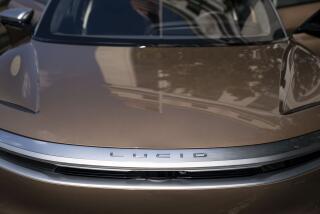U.S. Court Sides With Korean Auto Units in Antitrust Case
- Share via
A Los Angeles County Superior Court judge Tuesday sided with the U.S. subsidiaries of Korea’s largest automakers in a case that had accused them of violating antitrust laws.
But the judge, Haley Fromholz, left open the possibility that those allegations, which were part of a wrongful termination complaint, could be revived if the plaintiff returned to court with a stronger case.
The judge’s ruling came after Irvine-based Kia Motors America and Hyundai Motor America of Fountain Valley asked for an outright dismissal of a case brought by former Hyundai executive Soo Ho Suh.
Suh, 48, had accused executives of the two automakers of conspiring on pricing and marketing plans to avoid competing with each other in the U.S. market. He alleged that he was discharged because he refused to participate in those activities.
Kia and Hyundai argued that they could not violate antitrust laws because the two American subsidiaries are controlled by the same parent, Hyundai Motor Group, in South Korea. In 1998, Hyundai became a leading shareholder in Kia, eventually purchasing more than 44% of its former rival’s shares.
Although Fromholz agreed with the companies, he put his decision on hold for 10 days to give Suh time to amend his complaint. Suh’s attorney, Barry Silver, said he was delighted that the court had given his client a second chance.
Attorneys for Hyundai and Kia expressed confidence Tuesday that they would prevail based on the judge’s initial ruling, noting that they expect similar allegations involving the Korean parent companies to be dismissed as well.
Fromholz based his initial ruling on a U.S. Supreme Court case and lower court decisions stating that companies with shared economic interests, such as a parent and its subsidiary, cannot be considered conspirators under antitrust laws.
In his ruling Tuesday, the judge also threw out Suh’s wrongful termination and breach of contract claims because they were based on the antitrust allegations.
Attorneys for the Korean automakers maintain that Suh was dismissed because of alleged misconduct that took place when he managed Hyundai’s India unit. Suh denies this and has filed a separate defamation claim against a Hyundai executive in connection with this case.






